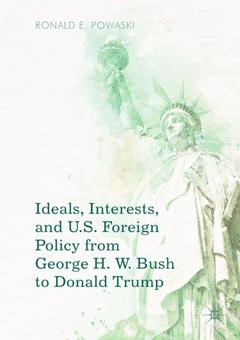Description
Ideals, Interests, and U.S. Foreign Policy from George H. W. Bush to Donald Trump, 1st ed. 2019
Author: Powaski Ronald E.
Language: English
Subject for Ideals, Interests, and U.S. Foreign Policy from George...:
Keywords
realism; pragmatic idealism; neoconservatism; idealistic realist; Clinton; Trump; Bush; us politics
Approximative price 52.74 €
In Print (Delivery period: 15 days).
Add to cartSupport: Print on demand
Description
/li>Contents
/li>Biography
/li>Comment
/li>
This volume discusses the presidential foreign policies of the post?Cold War era, beginning with George H. W. Bush and ending with the first 17 months of Donald Trump?s presidency. During this period, the United States emerged from the Cold War as the world?s most powerful nation. Nevertheless, the presidents of this era faced a host of problems that tested their ability to successfully blend realism and idealism. Some were more successful than others.
Ronald Powaski is Adjunct Professor at Ashland University, USA, formerly teaching U.S. history at Cleveland State University. Among his published books are March to Armageddon: The United States, the Soviet Union, and the Nuclear Arms Race, The Cold War: The United States and the Soviet Union, and most recently, a two-volume study, American Presidential Statecraft.
Offers accessible and original engagement with the Foreign Policy of 5 of the last US presidential administrations, including that of Donald Trump
Examines the impact of character, personality, charisma and personal political philosophy of each president on their Foreign Policy agenda
Targets international relations, foreign policy, diplomacy, US politics and presidential politics scholars as well as a general interest audience




